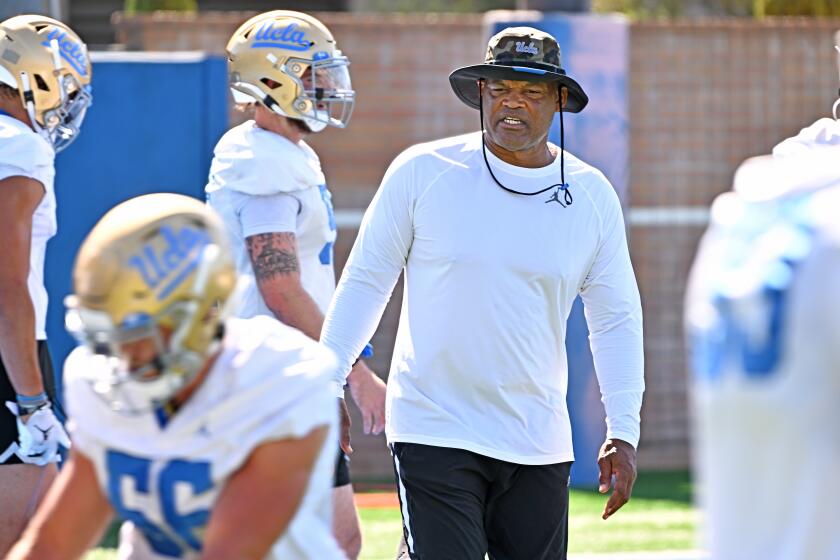A fraction of the man he used to be, Atonio Mafi is ready to dominate for UCLA
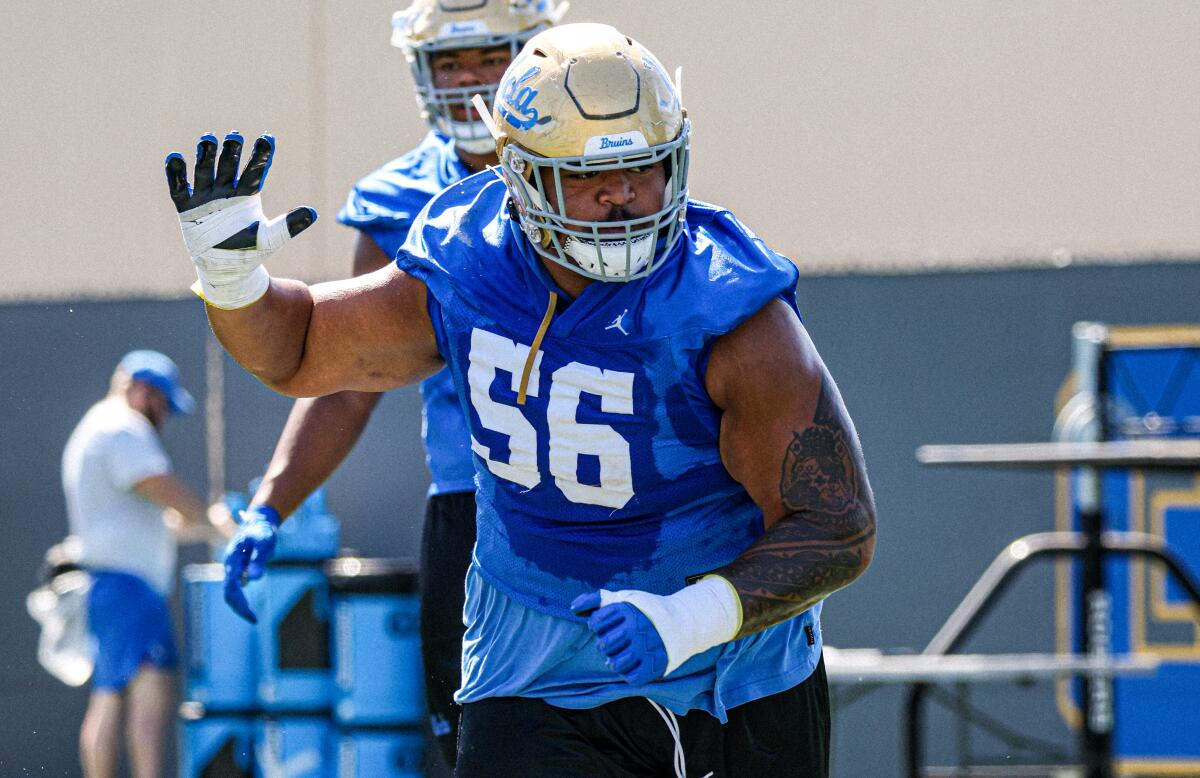
- Share via
Late at night, craving the comfort of Flamin’ Hot Cheetos, he hears the words.
If you lose the weight, you’ll have a shot.
Longing for his mom’s lamb chops swimming in coconut milk, he hears the words.
If you lose the weight, you’ll have a shot.
Wishing he could splurge for his favorite In-N-Out order of a triple cheeseburger, double-double, animal-style fries, regular fries and a strawberry milkshake, he hears the words.
If you lose the weight, you’ll have a shot.
The words are annoying. They keep him starving. They momentarily make him want to abandon this whole giving-up-what-he-loves madness.
Atonio Mafi marinates in those words, the UCLA offensive lineman remembering how he once strained the scale at 411 pounds, stretching the fabric of his XXXXL jersey on a frame measuring 6-foot-2.
A member of the last UCLA team to win a Rose Bowl, in January 1986, new inside linebackers coach Ken Norton Jr. is forging a new legacy at his alma mater.
At his lowest moments, he contemplates how those words saved his career.
Having dropped the weight equivalent of a third-grader, now down to 340 pounds, the fifth-year senior considers how he’s going to push through his hunger one more time.
Yep, here come those words again.
“That’s what I keep hearing when those certain times come in,” Mafi said of the moments when he’s tempted to give in, “and then I go and chug a water and get full off of water.”
He’s lost the weight. He’s got a shot.
Every bite he took, his mind thanked him. His body didn’t.
His favorite fast-food meal consisting of five beef patties with cheese plus a double order of fries and a shake added up to 3,240 calories and 177 grams of fat, according to nutritional information provided by In-N-Out and FatSecret. That’s more than 150% of the U.S. Food and Drug Administration’s recommended calorie intake for one day.
Similarly fattening spreads were scarfed down at home, Mafi relishing every bite of his mom’s Lu Pulu, with its savory beef or lamb wrapped in taro leaves and other Tongan delicacies. Staying true to his Polynesian heritage, Mafi liked to drown everything in mayonnaise, once even trying it on pizza.
He laughed when asked what sorts of tabs he kept on his eating.
“That’s why I was big,” he said, “because I wasn’t counting my calorie intake.”
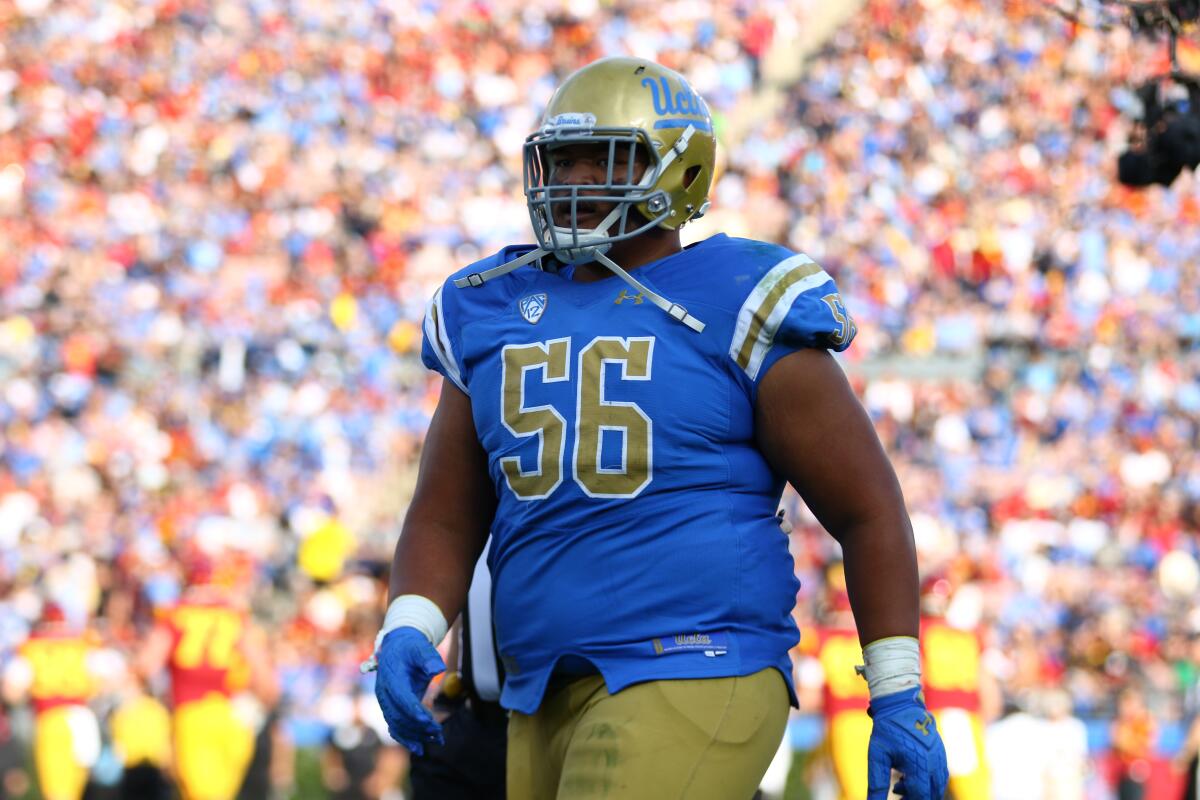
His all-time recorded high of 411 pounds came the first time he stepped on the scale inside the Wasserman Football Center before fall training camp in 2018. Oh, dang, he thought. Roughly 25 pounds had been packed on in the preceding months while he recovered from an Achilles’ tendon injury suffered in a high school playoff game.
When Mafi crammed into the device resembling a giant egg that players call the “bod pod,” it revealed another disturbing number — 40% body fat.
He was issued an oversized bed and pants to accommodate his size-50 waist, but there was no easy answer for the fatigue that overtook him in practice. Only minutes into each session, he was dragging.
“After the first or second period,” Mafi said, “I was gassed.”
Small victories followed. By cutting back on what he ate or upping his cardio whenever he binged, he slimmed down to around 390 pounds by the season opener. He was the only true freshman starter on the defensive line — his original college position — after winning the job in camp. By the first game of 2019, he was at 357.
A switch to offensive line came in 2020 amid the team’s shortage of bodies at the position. But Mafi’s weight remained steady, hovering around 355. Those extra pounds kept him from finding the acceleration needed to reach linebackers whenever he tried to block downfield.
None of his usual tricks could help him get any thinner. His motivation fluctuated like his weight.
When he started winter quarter in January, the scale reflected his waning focus. He was back up to 377. His final season beckoned.
Entering the world at 9 pounds and 21 inches, Mafi was born to eat. It’s part of his culture.
“In the Tongan house, there’s always food,” said his father, Peter. “It’s just the way it is.”
Atonio — ‘Nio, his friends and family call him — devoured everything, with one exception.
“He’s not into vegetables,” Peter said with a hearty laugh.
Always the biggest kid in his class, Atonio started to realize he was different around the fourth grade. He was the only one expanding exponentially. There was no pediatric growth chart that applied to him. He kept getting in trouble for roughhousing after accidentally bowling over friends.
Just like his older brother, Atonio exceeded weight limits for youth football. The alternative was rugby. It was the sport his father had starred in professionally back in his homeland, earning the nickname “Tongan Steel.” Peter’s workouts in those days included a 40-minute swim between islands.
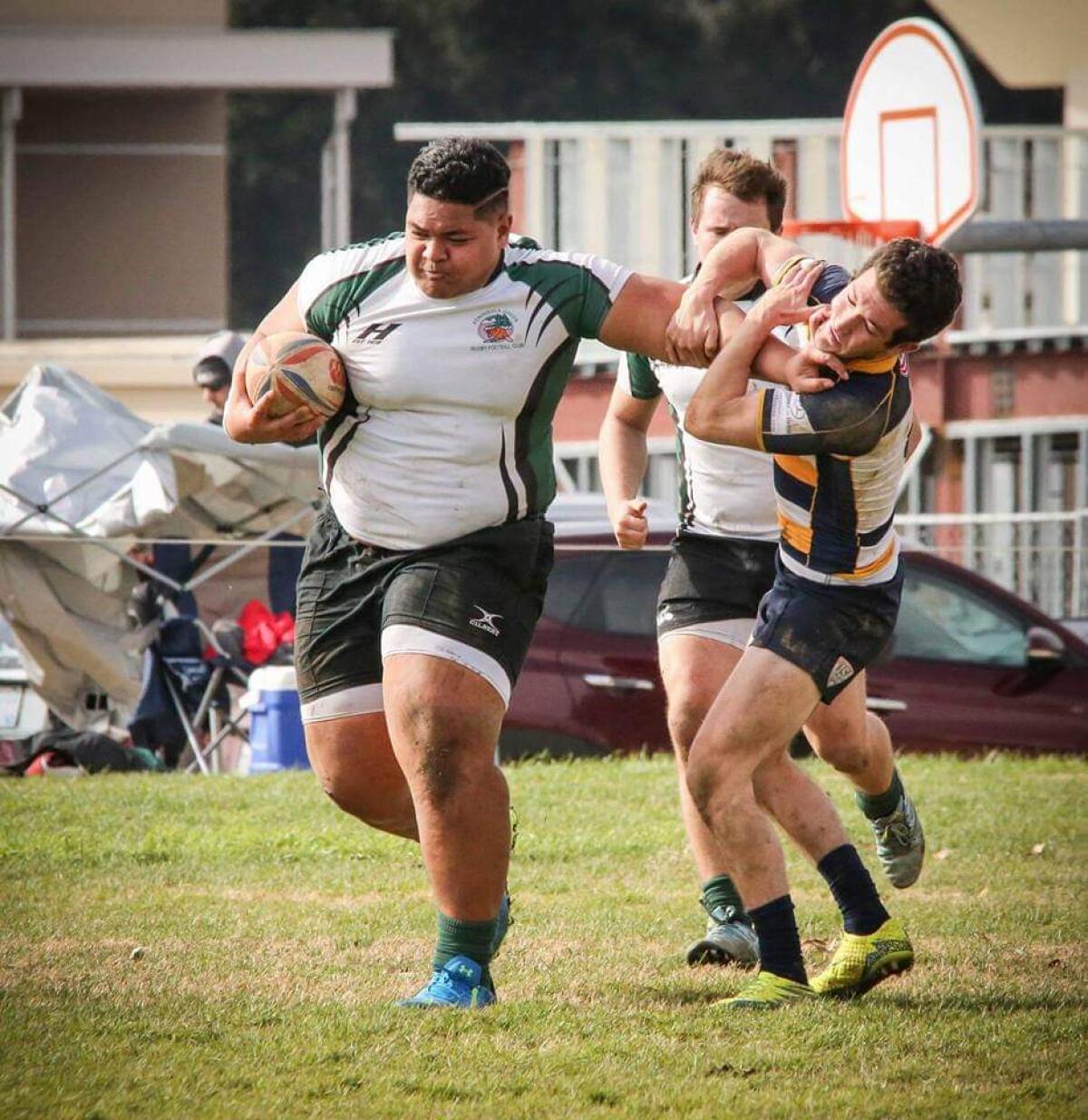
Atonio would occasionally break off a long run, using his girth to pulverize anyone in his way, but his effectiveness was limited by the fatigue that immediately set in because of the extra pounds he lugged.
Finally freed to play football in high school, Mafi emerged as a two-way standout. He led San Mateo Serra to its first West Catholic Athletic League title in 48 years while becoming the first lineman to win the league’s player of the year award.
Mafi had always wanted to go to UCLA but didn’t receive a scholarship offer. He was set to attend California until he noticed that Jerry Azzinaro, a Golden Bears assistant under coach Justin Wilcox, did not attend a recruiting visit. About 30 minutes after Wilcox left Mafi’s home, a reporter called, inquiring about rumors that Azzinaro was headed to UCLA to become part of new Bruins coach Chip Kelly’s staff.
Mafi didn’t comment but knew what this meant. Azzinaro had been doggedly recruiting him and surely would want him to come along to his next school.
“I looked at my dad,” Mafi remembered, “and said, ‘I think we might go to UCLA.’”
Only two players on UCLA’s roster have appeared in every game Kelly has coached at the school: Mafi and safety Stephan Blaylock.
Being there is one thing, dominating another.
As Kelly sized up Mafi during a meeting in January, the veteran guard weighing more than he had since he was a freshman, the coach laid it out plainly. If Mafi wanted to shine in his final college season and make the NFL, he needed to commit to change.
If you lose the weight, you’ll have a shot.
The words stuck with Mafi like one of his tattoos. They echoed every time he filled his plate and was tempted to cheat the diet plan he formulated with Ross Shumway, the team’s nutritionist.
Breakfasts usually consisted of yogurt and fruit so that he wouldn’t overstuff himself before practice. That was the easy part.
“You watch what he’s doing on the field right now, and you kind of get excited.”
— Chip Kelly, UCLA coach, on Atonio Mafi
Navigating the world-class buffet spread inside the team’s practice facility meant mastering a new kind of playbook. Mafi loaded up on salads, and if he added any croutons then he’d have to skip the carb of the day whether it’s rice, potatoes or bread. His plate was also invariably piled high with whatever protein was available, be it fish, chicken or beef. Harder practices meant he could indulge in slightly larger portions.
The goal was to consume 3,500 to 4,000 calories per day. Mafi sent photos of meals to Shumway for feedback and tracked everything he ate on Notemeal, a nutrition app that also provided a suggested blueprint for the kinds of things he should eat.
Coaches would arrive at the practice facility in the morning to see Mafi already churning away on the elliptical machine or the stationary bike, having gotten there as early as 6:20 a.m. Putting on headphones to settle in for an episode of “Criminal Minds” on his iPhone, Mafi knew that as soon as the show was over his workout was done.
Encouragement came from teammates who noticed his slimdown.
“We miss the old ‘Nio,” one would say with a smile.
“Don’t get too skinny on us,” another would kid.
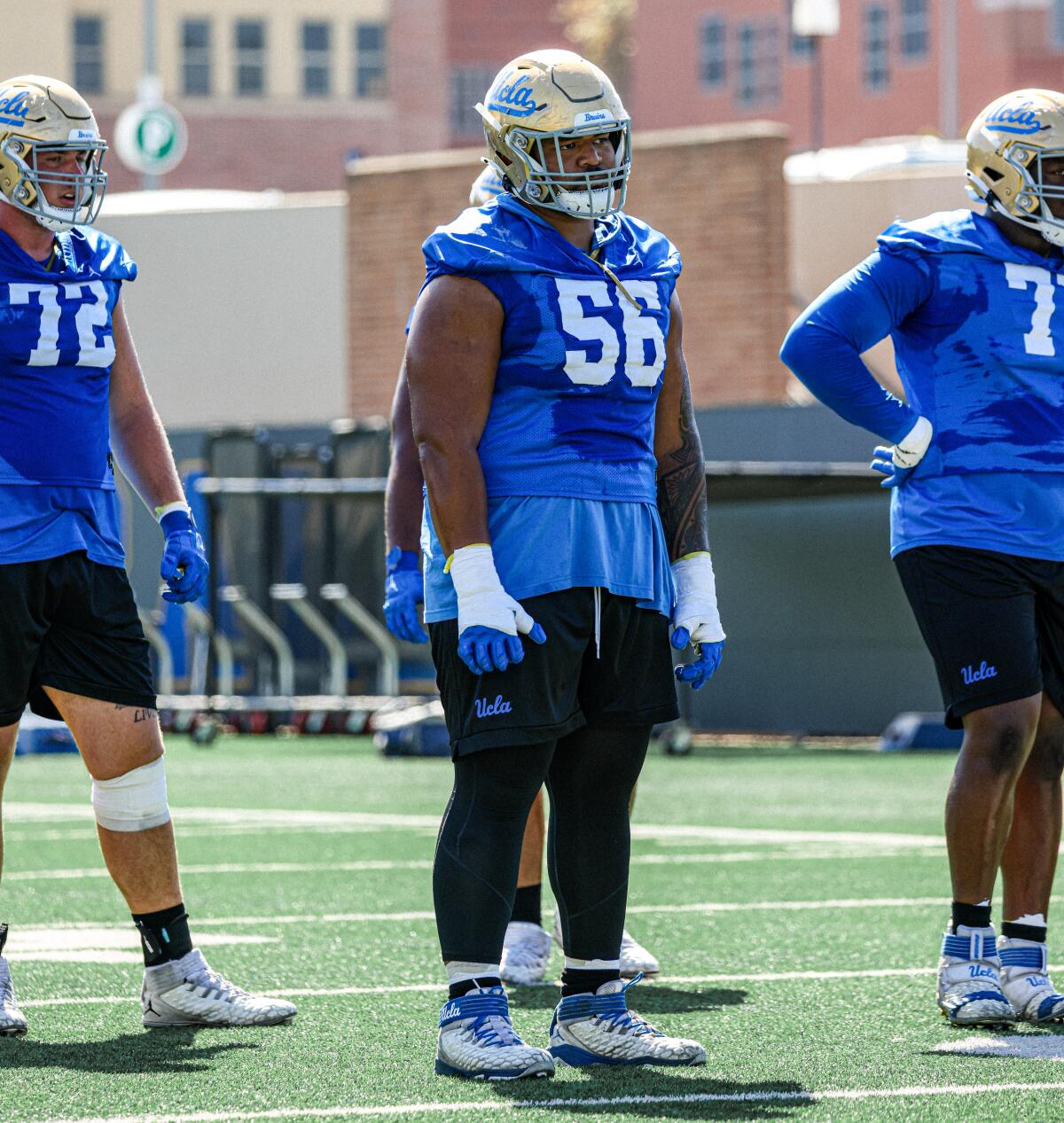
Clothes started to fit looser. He went down to an XXXL jersey and a 42 waist. He no longer needed a seatbelt extender on airplanes. When he sat in the “bod pod,” he learned his body fat was now at 26%.
Mafi was getting closer to a size that could extend his career. The average weight for an NFL offensive lineman at the end of last season was 314 pounds, with New England’s Trenton Brown the heaviest at 380.
At 340 pounds, Mafi had essentially reached his target weight. He hasn’t been this light since he was a freshman or sophomore — in high school. If he dropped five more pounds, great. If not, it’s just as well.
His movement is more fluid, his increased stamina allowing him to make those downfield blocks he couldn’t previously.
“You watch what he’s doing on the field right now,” Kelly said, “and you kind of get excited.”
No one’s happier than the player who’s a fraction of the man he used to be, Mafi no longer needing to commandeer the front seat whenever he hops in a car with teammates.
Reflexively calling shotgun, Mafi is reminded he no longer needs all that space.
“You ain’t that fat no more,” a teammate will say, “hop in the back!”
No problem. He’s lost the weight. He’s got a shot to be whatever he wants.
More to Read
Go beyond the scoreboard
Get the latest on L.A.'s teams in the daily Sports Report newsletter.
You may occasionally receive promotional content from the Los Angeles Times.

